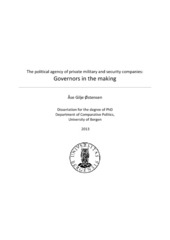| dc.contributor.author | Østensen, Åse Gilje | eng |
| dc.date.accessioned | 2014-01-23T15:17:23Z | |
| dc.date.available | 2014-01-23T15:17:23Z | |
| dc.date.issued | 2013-06-06 | eng |
| dc.identifier.isbn | 978-82-308-2309-5 | |
| dc.identifier.uri | https://hdl.handle.net/1956/7695 | |
| dc.description.abstract | This thesis studies the political agency of private military and security companies (PMSCs) and, in particular, the legitimation of their authority. Four case studies provide four inroads into the manner in which these companies form part of a wider organization of risk managers, and in different ways function habitually within the established confinements of international security governance. The thesis argues that commercial security providers are increasingly becoming part of established responses to insecurity and that they are increasingly accepted as such. The dissertation, thus, essentially aims to increase understandings of how PMSCs participate in the making of security policy, how their power to do so is acquired, and how their authority is conditioned by legitimacy and legitimation processes. The thesis attacks the research question from two angles. Firstly, it studies how the industry itself works strategically to produce perceptions of legitimacy. In order to do that, the first article analyses how PMSC legitimacy may be construed and presents a multidimensional conception of legitimacy. Second, the last three articles study how PMSCs act politically within hybrid constellations or networks of security governors, and what the implications are for governance in each particular context. They argue that not only do PMSCs have political influence within these constellations, but that their increasing establishment in the spheres of security professionalism reinforces their political authority and contributes to align them within security governance, or put differently, to legitimize their agency within the governance of transnational security. The different articles find that the agency of PMSCs has important implications in the contexts discussed. One common consequence of this type of governance is that there is poor transparency into who governs and accordingly little awareness of the role that private military and security companies actually play. The thesis employs four cases studies to study the political agency of private military and security companies. These studies build upon theoretical achievements within the existing PMSCs literature and those within the broader governance literature to advance a theoretical understanding of the legitimation processes. The thesis uses a variety of interviews, communication and documents, along with a wide variety of secondary sources, to detail how commercial military and security companies increasingly function as legitimate governors within global security constellations. The thesis consists of an introductory chapter providing the theoretical and methodological foundation for the study, followed by four articles. | en_US |
| dc.language.iso | eng | eng |
| dc.publisher | The University of Bergen | eng |
| dc.relation.haspart | Paper I: ‘In from the cold? Self-legitimating the market for private security’ Global Change, Peace & Security, Vol. 23, No. 3, October 2011, pp. 369-385. Full-text not available in BORA due to publisher restrictions. The article is available at: <a href="http://dx.doi.org/10.1080/14781158.2011.601856" target="blank">http://dx.doi.org/10.1080/14781158.2011.601856</a> | eng |
| dc.relation.haspart | Paper II: ‘Norway. Keeping up Appearances’ In Leander, Anna (ed.) Commercialising Security in Europe. Political consequences for Peace and Reconciliation Efforts. London: Routledge, 2013. Full-text not available in BORA due to publisher restrictions. | eng |
| dc.relation.haspart | Paper III: (Non)governing security on the high seas. Norway’s approach to the use of armed guards to counter piracy. Under review in an international journal. Full-text not available in BORA. | eng |
| dc.relation.haspart | Paper IV:‘In the Business of Peace: The Political Influence of Private Military and Security Companies on UN Peacekeeping’ International Peacekeeping, Vol. 20, No. 1, February 2013, pp. 1-15. Full-text not available in BORA due to publisher restrictions. The article is available at: <a href="http://dx.doi.org/10.1080/13533312.2012.761872" target="blank"> http://dx.doi.org/10.1080/13533312.2012.761872</a> | eng |
| dc.title | The political agency of private military and security companies: Govenors in the making | eng |
| dc.type | Doctoral thesis | en_US |
| dc.rights.holder | Copyright the author. All rights reserved | en_US |
